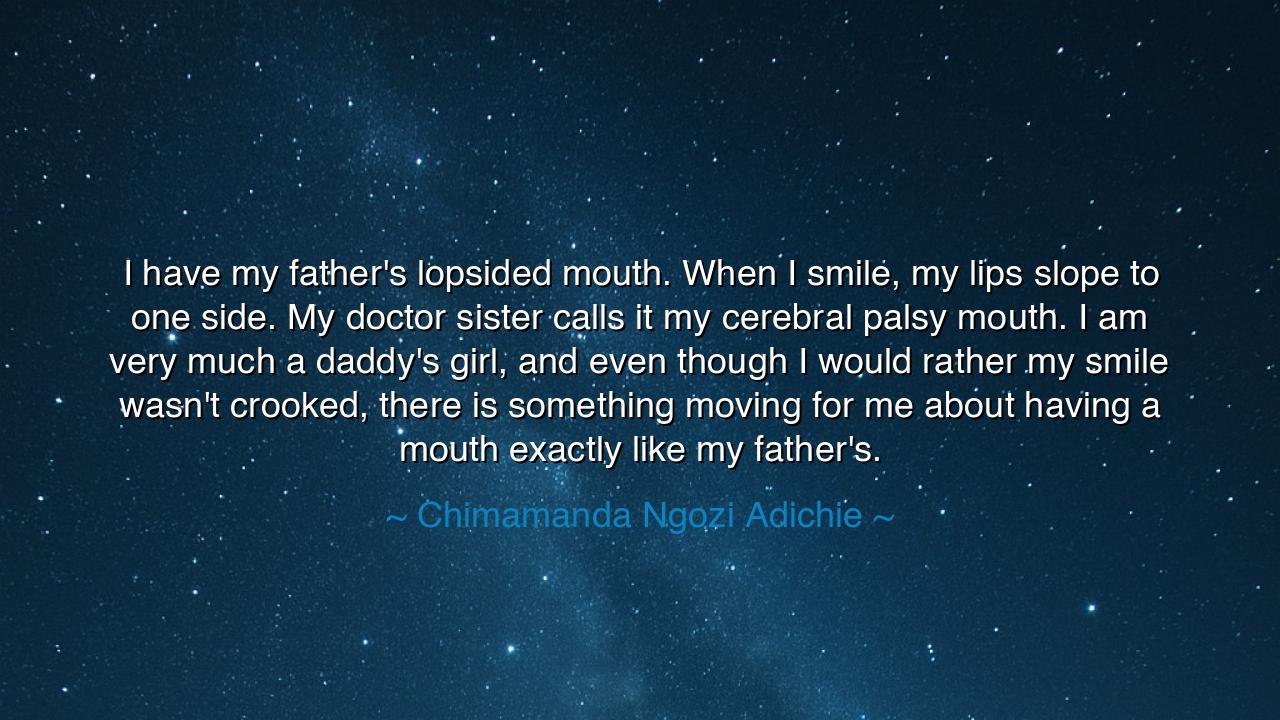
I have my father's lopsided mouth. When I smile, my lips slope to
I have my father's lopsided mouth. When I smile, my lips slope to one side. My doctor sister calls it my cerebral palsy mouth. I am very much a daddy's girl, and even though I would rather my smile wasn't crooked, there is something moving for me about having a mouth exactly like my father's.






Hear the words of Chimamanda Ngozi Adichie: “I have my father’s lopsided mouth. When I smile, my lips slope to one side. My doctor sister calls it my cerebral palsy mouth. I am very much a daddy’s girl, and even though I would rather my smile wasn’t crooked, there is something moving for me about having a mouth exactly like my father’s.” At first, these words seem tender and personal, a daughter’s reflection on a feature inherited from her father. Yet within them lies a profound meditation on memory, on identity, on the strange beauty of imperfection, and on the bonds that connect us across generations. The smile, though crooked, becomes a sacred inheritance, a sign that what is loved in the father lives on in the daughter.
The ancients knew this truth well: that in our bodies we carry not only our own selves, but the echoes of those who came before us. The Romans revered the imago, the wax mask of an ancestor, preserved to remind each generation of its lineage. For Adichie, the lopsided mouth is such a mask—not fashioned from wax, but written into her very flesh. And though she admits to wishing her smile were otherwise, she also treasures it, for in its crookedness she sees the face of her father. Thus, what she once judged as flaw becomes remembrance, a living relic of love.
Consider the tale of Alexander the Great, who was said to walk with a tilt of the head, just as his father Philip did before him. What might have been seen as imperfection became a sign of heritage, a reminder to all who followed him that greatness and humanity were intertwined. So too with Adichie’s crooked smile: what others may call defect becomes instead a bond, a reminder of love stronger than symmetry.
There is also humility in her words. She does not pretend to wholly embrace the imperfection, for she confesses, “I would rather my smile wasn’t crooked.” This honesty deepens the meaning: love does not erase longing, and memory does not demand denial of difficulty. Instead, she embraces the paradox—that something she might reject in herself becomes precious when seen as an inheritance from her father. This is the complexity of human love: it transforms even the things we dislike into things we would not trade, because they tether us to the ones we cherish.
And yet, her reflection is not only about family but about identity itself. For what are we, if not mosaics of those who came before us? Our gestures, our voices, our crooked smiles, our ways of moving—all carry fragments of those who shaped us. Adichie’s lopsided mouth is more than a quirk; it is her father’s presence written on her face, a reminder that though he may not always be near, he lives on each time her lips curve to one side. Thus her imperfection becomes a kind of immortality, a lineage inscribed not in monuments, but in flesh.
The lesson for us, then, is profound: embrace the imperfections that tie us to those we love. Do not despise them as flaws, but see them as threads in the great tapestry of inheritance. When you look into the mirror and see your parent’s eyes, your grandmother’s hands, your father’s smile, crooked or straight—know that these are not burdens but blessings. They remind us that we are never alone, that our bodies carry the story of those who came before.
So let this wisdom endure: cherish your smile, whether lopsided or straight, for it is not yours alone—it is the echo of those who gave you life. Embrace the features you once rejected, for within them lies the memory of love, the bond of family, the unbroken chain of generations. And when you see in yourself the face of another, let your heart be moved, as Adichie’s is, to gratitude. For in those reflections we find not imperfection, but the eternal truth that we are made of those we love.






AAdministratorAdministrator
Welcome, honored guests. Please leave a comment, we will respond soon